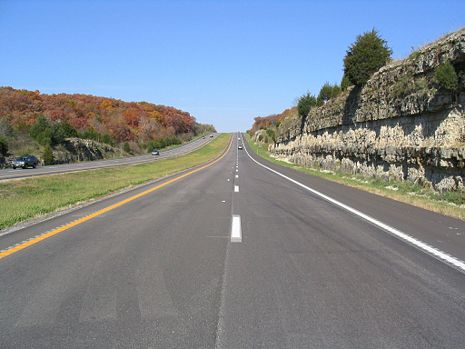Category:620 Pavement Marking: Difference between revisions
Jump to navigation
Jump to search
m Per Traffic, update of two JSPs (epoxy and high build) |
m →Pavement Marking Guidelines: Per Traffic, two notes added for clarification of table info |
||
| Line 61: | Line 61: | ||
! !! !! Colspan="2" style="background:#BEBEBE"|Divided Highways !! style="background:#BEBEBE"|Undivided Highways | ! !! !! Colspan="2" style="background:#BEBEBE"|Divided Highways !! style="background:#BEBEBE"|Undivided Highways | ||
|- | |- | ||
! !! !! style="background:#BEBEBE"|Lane Lines !! style="background:#BEBEBE"|All Other Markings !! style="background:#BEBEBE"|All Markings | ! !! !! style="background:#BEBEBE"|Lane Lines<sup>1</sup> !! style="background:#BEBEBE"|All Other Markings<sup>2</sup> !! style="background:#BEBEBE"|All Markings | ||
|- | |- | ||
|rowspan="3" align="center" style="background:#F5F5F7"|'''Contractor Installations''' || align="center" style="width:15%"| '''Major Roads''' || Grooved in wet reflective system using either epoxy or high build paint. Contrast markings on concrete. Minimum initial readings of 450 mcd/m<sup>2</sup>/lux required || Waterborne paint with type P beads || Waterborne paint with type P beads | |rowspan="3" align="center" style="background:#F5F5F7"|'''Contractor Installations''' || align="center" style="width:15%"| '''Major Roads''' || Grooved in wet reflective system using either epoxy or high build paint. Contrast markings on concrete. Minimum initial readings of 450 mcd/m<sup>2</sup>/lux required || Waterborne paint with type P beads || Waterborne paint with type P beads | ||
|- | |- | ||
| align="center"|'''Minor Roads''' || | | align="center"|'''Minor Roads''' ||colspan="3"| Waterborne paint with type P beads | ||
|- | |- | ||
|align="center"|'''Intersection Markings'''||colspan="3"|Type 2 tape, preformed thermoplastic or waterborne paint | |align="center"|'''Intersection Markings'''||colspan="3"|Type 2 tape, preformed thermoplastic or waterborne paint | ||
|- | |- | ||
|rowspan="5" align="center" style="background:#F5F5F7"| '''MoDOT Forces''' ||align="center"| '''Major Roads''' – shall be striped by Memorial Day unless there is a performing durable marking|| | |rowspan="5" align="center" style="background:#F5F5F7"| '''MoDOT Forces''' ||align="center"| '''Major Roads''' – shall be striped by Memorial Day unless there is a performing durable marking||colspan="3"|Waterborne paint with type PM beads | ||
|- | |- | ||
|align="center"|'''Regionally Significant Roads''' – shall be striped annually || | |align="center"|'''Regionally Significant Roads''' – shall be striped annually ||colspan="3"|Waterborne paint with type PM beads | ||
|- | |- | ||
|align="center"|'''Other Minor Roads''' – maximum of 50 percent striped annually || | |align="center"|'''Other Minor Roads''' – maximum of 50 percent striped annually ||colspan="3"|Waterborne paint with type PM beads | ||
|- | |- | ||
|align="center"| '''Intersection Markings'''||colspan="3"|Type 2 tape, preformed thermoplastic or waterborne paint | |align="center"| '''Intersection Markings'''||colspan="3"|Type 2 tape, preformed thermoplastic or waterborne paint | ||
|- | |- | ||
|align="center"|'''Surface Treatments'''||Waterborne paint with type PM beads|| | |align="center"|'''Surface Treatments'''||colspan="3"|Waterborne paint with type PM beads | ||
|- | |||
|colspan="5" align="left"|<sup>'''1'''</sup> Lane Lines are broken (skips), dotted or solid white lines used to delineate the edge of the travel way where travel is permitted in the same direction on both sides of the line. They can be used to separate through lanes from other through lanes, through lanes from left or right turn lanes, or turn lanes from other turn lanes (i.e. dual left turn lanes). | |||
|- | |||
|colspan="5" align="left"|<sup>'''2'''</sup> Typically edgelines and gores. Edgelines are solid lines that are used to separate the travel lane from the shoulder. They can be either yellow or white. Gores are double wide lines used on exit and entrance ramps. | |||
|} | |} | ||
Revision as of 08:53, 19 September 2011

| Pavement Marking Operations Direction (Practical Operations Pavement Marking Implementation Plan) |
| Striping Communications Plan |
Pavement Marking Guidelines
| Divided Highways | Undivided Highways | |||
|---|---|---|---|---|
| Lane Lines1 | All Other Markings2 | All Markings | ||
| Contractor Installations | Major Roads | Grooved in wet reflective system using either epoxy or high build paint. Contrast markings on concrete. Minimum initial readings of 450 mcd/m2/lux required | Waterborne paint with type P beads | Waterborne paint with type P beads |
| Minor Roads | Waterborne paint with type P beads | |||
| Intersection Markings | Type 2 tape, preformed thermoplastic or waterborne paint | |||
| MoDOT Forces | Major Roads – shall be striped by Memorial Day unless there is a performing durable marking | Waterborne paint with type PM beads | ||
| Regionally Significant Roads – shall be striped annually | Waterborne paint with type PM beads | |||
| Other Minor Roads – maximum of 50 percent striped annually | Waterborne paint with type PM beads | |||
| Intersection Markings | Type 2 tape, preformed thermoplastic or waterborne paint | |||
| Surface Treatments | Waterborne paint with type PM beads | |||
| 1 Lane Lines are broken (skips), dotted or solid white lines used to delineate the edge of the travel way where travel is permitted in the same direction on both sides of the line. They can be used to separate through lanes from other through lanes, through lanes from left or right turn lanes, or turn lanes from other turn lanes (i.e. dual left turn lanes). | ||||
| 2 Typically edgelines and gores. Edgelines are solid lines that are used to separate the travel lane from the shoulder. They can be either yellow or white. Gores are double wide lines used on exit and entrance ramps. | ||||
Articles in "620 Pavement Marking"
The following 14 pages are in this category, out of 14 total.
6
- 620.1 General (MUTCD Chapter 3A)
- 620.2 Pavement and Curb Markings (MUTCD Chapter 3B)
- 620.3 Roundabout Markings (MUTCD Chapter 3C)
- 620.4 Markings for Preferential Lanes (MUTCD Chapter 3D)
- 620.5 Delineators (MUTCD Chapter 3F)
- 620.6 Colored Pavements
- 620.7 Channelizing Devices Used for Emphasis or Pavement Marking Patterns
- 620.8 Islands
- 620.9 Rumble Strip Markings
- 620.10 Operational Procedures and Safety
- 620.11 Guidelines for Using Water-Borne Traffic Paint
- 620.12 Construction Inspection for Sec 620
- 620.13 Measurement of Retroreflectivity by Handheld Retroreflectometers
- 620.14 3M Installation Contract